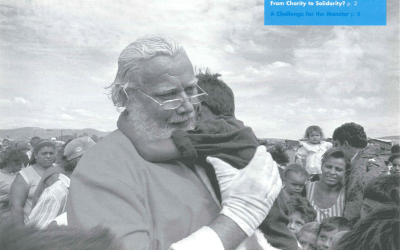GIFE: Strengthening Civil Society
Brazilian philanthropy is not a new phenomenon. Since the Portuguese colonized Brazil as a Catholic community in the 1500s, charities have been present from the very beginning of its history. Health and education were provided for by Catholic organizations, many of which were responsible (and still are in part) for the education of many generations of the elite, born, as well, in Catholic hospitals.
These Catholic institutions were, at one point of Brazil’s history, practically the sole providers of quality education and health services in the country.
So, what’s new? Democratization. That is what has changed the face of Brazilian philanthropy.
In the 80s, Brazil initiated its transition from a military dictatorship to a democratic regime. With a “slow and gradual loosening,” as the military used to characterize this process, Brazilian society began to exercise its constitutional rights, which had been suspended. Development of a new and irreversible political awareness got underway.
By the end of this decade, when the “slow and gradual loosening” process was nearly concluded, Brazilians elected their first president in 29 years. At the same time, the American Chamber of Commerce convoked a conference on philanthropy in São Paulo, resulting in the creation of a committee on philanthropy, supported by the Kellogg and Ford foundations. Composed mostly by Brazilian companies and corporate foundations, this group was the first indication that local funding not only existed, but had behind it powerful corporations willing to carry the movement towards a strong domestic philanthropic sector. The group includes companies such as Bradesco, Iochpe, Odebrecht, Roberto Marinho, Itaú Cultural and Vitae, as well as multinationals such as Xerox and Alcoa.
In 1992, the recently elected government underwent an impeachment process, which turned out to be a great opportunity for the exercise of citizenship by this young and eager civil society. A series of reports on corruption, some of which involved philanthropic institutions connected to elected officials, prompted the process.
This new democratic scenario called for a strong sense of citizenship understood as a set of rights and responsibilities. The Catholic charity approach of Brazilian philanthropy was based on the efforts of very committed individuals moved by strong personal convictions. Although unquestionably honorable, these efforts were a response to the lack of access by low-income groups to basic rights such health and education. The question of responsibilities, until then only a matter for the State, remained untouched by this traditional concept of philanthropy and the probing needs for the development of autonomy, unanswered.
The need for a civil society organization capable of demonstrating to the Brazilian society that community involvement was part of citizenship and that philanthropy could be, and was, done in an ethical manner, prompted the committee on philanthropy to formalize the group in 1995. GIFE–Group of Institutes, Foundations and Enterprises–was incorporated by 25 of today’s 64 members, with the mission of improving and disseminating the concepts and practices of the use of private resources for the development of the common good.
So it is not by chance that GIFE’s first formal decision was the approval of its Code of Ethics. Aside from establishing standards of conduct for the interaction of its members with all stakeholder groups, the Code pushes the social agenda one step further by defining social investment as the result of a sense of responsibility and reciprocity with society. A clear distinction is made between social investment by business and other activities such as marketing and sales promotion (for profit) and human resource policies and benefits intended to develop and retain the work force because these, in fact, are in the interest of the business, rather than the community.
This distinction is particularly important if one takes into account the development stage in which the Brazilian not-for-profit sector finds itself today.
Brazil’s greatest challenge is its concentration of wealth. Our economy grows, but so does the unjust distribution of its resources. While ranked as the world’s 10th largest economy, with a Gross National Product of US$ 742,8 billion, by UNDP – United Nations Development Program (World Development Report, 2000/2001), Brazil is the 69th country in wealth concentration, behind 11 other countries in Latin America.
The official agency IBGE Instituto Brasileiro de Geografia e Estatística (Brazilian Institute for Statistics and Geography) and the World Development Report (World Bank) indicate that we entered the 21st century with 10% of the population having 46.8% of the country’s wealth while 20% subsists on 3.6%.
With such shameful figures, any civil society organization truly committed to reducing Brazil’s social inequalities of especially one related to the business sector such as GIFE must think long and hard about this fact. It is mandatory for these civil society organizations to guarantee that the practice of social investment will contribute to the wealth distribution, or at least, not aggravate the inequity–a very real possibility if all this mobilization turns into a simple business strategy.
Obviously, and while we are on the subject of fairness and justice, it must be said that GIFE understands that a true social investor is entitled to expect, as a sub-product of a successful social investment, a greater added value for its image (principles of GIFE’s Code of Ethics). If our core business is social change, it is not only ethical but also just that businesses and corporate foundations gain from their social investment activities after the community has gained from the investments made. In other words, once community has ownership over the social change, GIFE understands that it is a true win-win situation.
If the unjust social-economic Brazilian scenario were not enough to sustain the importance of clarity for this concept of private social investment, two other factors reinforce this need.
The volume of funds being channeled by the private sector into social activities is one of them. IPEA Instituto de Pesquisa Econômica Aplicada, (Institute for Applied Economic Research), an independent national agency, has found that three of the country’s wealthiest regions have donated funds equivalent to 10% of their gross product. The Southeast alone, the wealthiest of the regions, donated approximately US$ 1.75 billion (precisely R$ 3,5 billions) in 1998. That’s a considerable figure for a developing country. If invested properly, this sum could effectively result in social change.
The fiscal framework is the second factor reinforcing the need for clarity in the concept of social investment. Today’s environment is, to say the least, unfriendly. The improvement of such a reality is an important challenge, one upon which GIFE has been working intensively with other representative organizations. When advocating for better fiscal incentives, we need clarity in the concept of private social investment. Distinction must be made between social investment activities private funds for public interests and investments with social characteristics, but for private interests, such as defined in GIFE’s Code of Ethics. Otherwise how can we assure Government and society as a whole that the requested tax exemptions are destined for public and not for private interests? Since tax money is public, GIFE is contributing its share of responsibility by making sure its members share the same, consistent concepts. We hope government will do its part recognizing the important role that the nearly 220,000 Brazilian civil society organizations have played in the last few years to improve the quality of life of many excluded Brazilians citizens.
Brazilian civil society has managed to move forward its social agenda, transforming, in the last decade, references and paradigms centuries old. The amount of money being donated is significant. The fact that philanthropy exists in spite of the lack of tax deductions for charitable purposes indicates an even higher level of commitment on behalf of the private sector. The decision to support sustainable projects that bring communities independence and autonomy has been made. The time is right and ripe for a stronger participation of the Brazilian corporate sector to contribute with financial resources. The figures above indicate that this is not only a desirable, but also a possible scenario. It is strategic for Brazil to have its society developed and fully empowered.
I believe that as the economy globalizes more and more each day, leading governments to define and articulate policies to protect such interests, civil society organizations should, as well, go global. Although maintaining their local focus, from where not-for-profit organizations derive their legitimacy, going global through the various networks available. It is in the international arena that organizations of civil society can play their most important role: to help regulate the interests of both government and business in favor of a more balanced international community. As the interests of the three sectors intertwine, I also believe that transparency, accountability, information and engagement–the basic elements of a sustainable society–should be valued by government, NGOs and businesses alike. GIFE welcomes this interaction.
Spring 2002, Volume I, Number 3
Related Articles
Obras de Infraestructura Básica de Fácil Ejecución a través de la Autogestión
En el Ecuador rural y en las zonas citadinas marginales, la carencia de servicios básicos se ha convertido en un mal endémico no resuelto hasta …
Responsabilidad Social Empresarial: Algunos Hechos Que Cuentan
La Responsabilidad Social Corporativa (RSC) es una temática más bien nueva en Chile. Aún cuando se encuentran acciones filantrópicas desde tiempos de la colonia, la relación de la …
Algunos Casos en Chile
Un caso fue José Tomás Urmeneta, un empresario del siglo XIX quien, en un momento de auge del sector agroexportador chileno, en su testamento dejó asignados recursos para …




